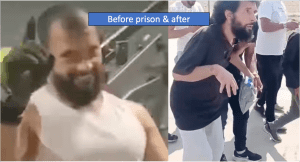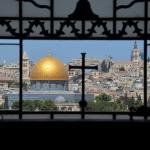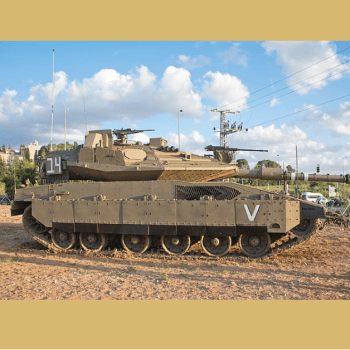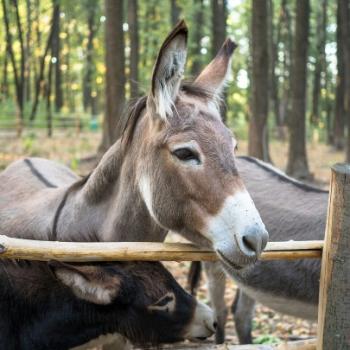I have the prison inside me’: The emaciated Palestinian bodybuilder broken by Israel
By Lubna Masarwa and Peter Oborne in Bethlehem, occupied Palestine, reposted from Middle East Eye
Muazzaz Abayat speaks to Middle East Eye from a hospital bed in his native Bethlehem after spending nearly nine months in Israeli administrative detention.
Emaciated, unable to walk unaided, his right arm jerking shapelessly in front of him and his face a picture of confusion, Muazzaz Abayat hobbles out of an Israeli prison.
Before the Israeli army arrested him late last year, Abayat was a big, confident man. An amateur bodybuilder, he weighed 240 lb, all muscle. After nine months in Israeli prisons, the Palestinian has lost more than half his body weight.

This is another grim, horrifying story from Israel’s war on Gaza.
Muazzaz Abayat has never been to Gaza. He was born and raised in the West Bank city of Bethlehem, where he worked as a butcher until Israeli forces smashed their way into his home at 2.30am on 26 October.
No charges were brought against Abayat during the nearly nine months he was kept in Israeli prisons. He was held under administrative detention, allowing a prisoner to be detained at the discretion of the local military commander without any charges being leveled.
NOTE: Israel is currently holding over 9,000 Palestinian prisoners in inhumane conditions where many are systematically tortured – 250 of them are children, 79 are women, and over 3,300 are administrative detainees – being held without charge or trial.
Administrative detention is intended to be used only in “exceptional” circumstances, but Israel uses it widely. Read more here.
HaMoked, an Israeli human rights group, reports that more than 3,500 of the 9,000 Palestinians currently locked up in Israeli prisons are held under administrative detention. Many, like Muazzaz Abayat, are from the West Bank. Since the Hamas-led attack of 7 October, this number has risen sharply.
Abayat told Middle East Eye that throughout his stay in jail, he was beaten, abused, tortured, starved and deprived of water. He said that his case was not an exceptional one. Every other Palestinian prisoner faces similar abuse.
NOTE: Israel’s National Security Minister Itamar Ben-Gvir has called for Palestinian prisoners to be executed, and boasted, “Since I assumed the position of Minister of National Security, one of the highest goals I have set for myself is to worsen the conditions of the [Palestinians] in the prisons, and to reduce their rights to the minimum required by law.”
He also bragged about the squalid conditions Palestinians are kept in, in remarks some observers have called an open admission that Israel is running concentration camps.
View this post on Instagram
Footage of Muazzaz Abayat’s stumbling departure from prison, his back bent, his arms bruised and crooked, has gone viral on Arab social media channels.
However, there has been little or no interest in western media. Middle East Eye was the first western media organization to interview the 39-year-old following his release.
NOTE: The New York Times, CNN, and other news outlets have investigated one notorious prison called Sde Tieman, and found horrific conditions.
A few other examples of reporting on Israeli prisons here, here, here.
Back in Bethlehem
We found him in a hospital in his native Bethlehem, where he is embarking on a long journey of recovery. His brother, Ahmed, was with him.
There was no flesh on his body, just skin and bone. The veins and muscles jutted out of his neck. The trauma of the past nine months was etched on his face.
Abayat was beaten so regularly, so brutally and by so many different people in prison that he now sees everyone as a potential threat. His first words to us were: “I have not been beaten for the three days since I left jail. I was told that I was not going to be beaten in this hospital.”
Speaking slowly but fluently, he warned us that he could not recall his life before Israeli soldiers arrested him: “I can’t get the prison out of my head and can’t remember. I am still living in the prison. I have the prison inside me.”
Medics told us they are still trying to understand his condition.
While prison is all too vivid to him, his family life is a blur. His brother told us that Abayat doesn’t recognize his father, even though he visits every day.
His wife, Noor, and mother, Mona, both collapsed to the ground when they saw their broken husband and son hobbling out of jail.
Abayat said he was in bed with his four young children (Noor was pregnant with their fifth child) when Israeli forces smashed their way into his family home.
“I asked why. They said that I am a murderer. I asked: ‘Who did I kill? You have broken into the house of a peaceful man with his wife and children and accused him of being a murderer.’”
Abayat told MEE that he would never forget what happened next. Pointing his finger at his temple, he said: “I remember all the details. It is all here in my head.”
The soldiers took him to the military investigation center at the nearby Israeli settlement of Gush Etzion. There, they manacled his hands with iron chains, placed a blindfold over his eyes and removed his clothes.
“They beat me while I was naked. They hit my left eye with an iron bar. I fell to the floor and lost consciousness until they threw cold water over me,” he said.
Over the following weeks, the military moved Abayat from base to base, subjecting him to more beatings at each station. As far as he could tell, there was no serious motive for the beatings inflicted on him. It was simply revenge for 7 October meted out to all Palestinians.
One day in particular sticks in his mind: “4 December was the day they broke my body, a huge crack.”
“They put me in a small chair and covered my eyes. My legs and arms were chained behind my back. A group of men attacked me and delivered a monstrous beating.”
Abayat said he was interviewed by an officer from Shin Bet, Israel’s internal intelligence service, who asked him: “Are you with us or with them?”
He recalls answering: “I am with no one. I am a Palestinian resident. You took a peaceful man from his house. I challenge all of Israel: did I have a weapon? Did they arrest me when I was shooting them? I was sleeping with my little kids between my babies and my pregnant wife.”
After the interrogation, the beatings resumed. “They put me in a bag. They broke my legs,” Abayat said, pulling back the bed cover to show the scars.
He remembered being placed in a van filled with what he calls “poison gas” until he passed out.
The Negev prison
The worst was yet to come. “All that I have described so far was a drop in the ocean compared to the prison in the Negev,” he said.
In the depths of winter, on 7 December, Abayat says he was taken to the notorious desert prison about 10km east of Israel’s border with Egypt.
“The moment you arrive there, they take off your clothes. They allow you just a T-shirt and trousers. There are no undergarments. The weather there is freezing. It is especially cold at night,” Abayat said.
During the day, a prison cell of 10 to a dozen men would share a liter bottle of water. There was one meal a day, and the food was so repulsive that inmates were often afraid to eat it for fear of becoming ill.
Speaking to MEE in April, Youssef Srour, a Palestinian prisoner in Negev, described the same conditions. Srour said they were assaulted four times a week and fed once a day “so we wouldn’t die”.
The prisoners were held in such close proximity that there was an epidemic of scabies. Only once during his approximately six months in jail was Abayat permitted to take a shower.
He spoke with special fear of guards who wore a green uniform and used broomsticks to “push us around like animals” while referring to the prisoners as “sons of pigs”. Abayat said that during some beatings, Israeli guards used security equipment to hit prisoners in their private parts.
He recalls one prisoner, Abu Asab, being left to die in a cell near his.
“They beat him to death and left him to die.”
Like other Palestinians who have been detained there, Abayat compared the Negev prison to the notorious US facilities at Guantanamo Bay and Abu Ghraib, where prisoners were tortured and abused.
Throughout this time, the father from Bethlehem was cut off from the world. He had no contact with his family, who learned what little they could about his condition from released prisoners. No lawyer represented him.
According to Abdullah al-Zaghari, the president of the Palestinian Prisoners Society, access to Israeli prisons for human rights organizations, including the Red Cross, is restricted, meaning that “there is no information about the situation of prisoners”.
He told MEE: “There are hundreds of prisoners in the same situation as Muazzaz.” Middle East Eye has written to the Israeli Prison Service, asking it to respond to the allegations detailed in this article.
‘The same abuse and torture’
Abayat insists that there was nothing unusual about his treatment. “Every prisoner arrested after 7 October was exposed to the same abuse and torture. I challenge the international press to track down one prisoner who was not tortured in the way I was,” he said.
NOTE: Read other testimonies from Palestinian prisoners here and here, for example.
Before we left his hospital bedside, we asked Abayat if he had a message for the world.
His answer surprised us: “We do not want you to free us from occupation. We want you to, at the very least, support our people.
“I am asking you to look at the condition of the Palestinian prisons. The country they call Israel is killing and torturing prisoners. There are horrible discoveries to be made.”
Looking terrified as he spoke, he expressed disbelief that “peaceful people with no power can be starved, tortured and killed” in the 21st century, with no protection, legal representation or international outrage.
Abayat’s account of his nine nightmare months in Israeli detention is entirely consistent with other reports emerging from the West Bank and Gaza. There are many other images of emaciated Palestinians hobbling out of Israeli jails, shadows of their former selves.
Abayat’s confinement is not an isolated story. His agony is shared by hundreds, if not thousands, of forgotten Palestinian prisoners who still languish in Israeli jails today.
I’m here for anyone who cares to have an intelligent conversation about reality, instead of living in a silo of confirmation bias.
I invite you to subscribe to my newsletter. I write about the Palestine-Israel issue regularly, and other issues relevant to progressives or those considering becoming progressive. If you would like to comment on this post, please pop over to my Facebook page. All of my posts are there and open to constructive comment. I welcome your thoughts.
I also commend to you If Americans Knew (full disclosure: I am a writer and editor there), where you can get factual reporting on the Palestine-Israel issue. I can personally vouch for its accuracy.
If you are interested, here are some of my earlier posts on the Palestine issue:
Further reading on the Palestine-Israel issue:
- Persecution of Christians in the Holy Land is surging
- A multiple-choice question: Who is Israel’s greatest enemy?
- This is the truth about “there is no famine in Gaza”
- Why as a Christian, I won’t be condemning Hamas anytime soon
- No surprise: US leaders have forgotten all about Gaza
- Introducing the Global Hall of Shame, Deflection & Denialism
- The Palestinians’ ironclad, inalienable right to resist
- Netanyahu exposes his profound racism in one glorious tweet
- Rafah attack: Netanyahu’s lies expose the truth about Israel
- A waking nightmare – what just happened in Gaza?
- Israel, the ICC, and the disintegration of our species
- The truth about Gazans as human shields –you’ll be surprised
- THIS RIGHT HERE is happening RIGHT NOW. This is Israel.
- Unlock the global and historic significance of this moment
- What to say when you’ve run out of words
- A 3-minute challenge to see whether you are alive
- Did you know the US is complicit in genocide RIGHT NOW?
- 5 tips for finding the best news reporting on Palestine
- You need to meet this little girl named Hind
- Does Israel really have “the most moral army in the world”?
- Western “civilization” exposed for its colossal ruthlessness
- To Biden, Palestinian genocide is already complete
- The lies we believe about Gazan Christians are killing them
- Can followers of the Prince of Peace support a group that uses violence?
- Why support for Palestinian resistance is the right response for Christians
- A Palestinian Pastor’s powerful message to us: “it’s time to stop praying”
- Christians: Why do we skimp on compassion when it comes to Palestinians?
- Don’t compromise truth on Israel and Palestine
- What People Of Faith Need To Know About Gaza And Israel Right Now
Posts about my family in Gaza (in chronological order):
- Follow this refugee family’s quest for survival in Gaza
- The hardest decision our family in Gaza has ever made
- The unexpected one-word message coming out of Gaza today
- The new normal: eating during a famine in Gaza
- The truth about Gaza: “I swear, we don’t mind death”
- The reality of survival in Gaza, on Spiritual Brewpub
- 3 funerals and a wedding in Gaza
- “We’re surrounded. Israelis are everywhere. We are dying.”
- “We were surrounded by tanks. It’s a miracle we got out.”
- “If I Should Die Before I Wake”
FEATURED IMAGE: by Filip Andrejevic via Unsplash

















